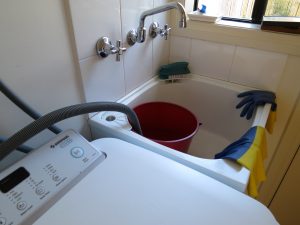Greywater can be reused for the garden or flushing the toilet as a way to both cut your water bills by up to a third and to create a buffer against water shortages.
What is Greywater?
Greywater is any water that goes down the drain that is not sewage (e.g. toilet water) which is known as blackwater.
Greywater varies in quality from almost drinkable (from the shower drain without contamination from soaps, shampoos or body wash products) to kitchen sink wash water which shouldn’t be reused unless treated properly.
Simple ways to use greywater:
The shower bucket
- If you use a normal shower, it will have to push 3-5 litres of cold water out of the pipes before the hot water gets to you unless someone just had a shower.
- Leave a 10 litre bucket in the shower and you can collect this water while the shower warms up and then move it aside when you shower.
- Whilst using hot water at sinks and basins wastes a lot of energy (see Hot water), if you insist on doing it, you can at least catch the first 3-5 litres of cold water that needs to be pushed out of the pipes.
- This is high quality water; it can be used anywhere in the garden, tipped into the washing machine (if you have a top loader) or used to bucket flush a toilet.
The kitchen bucket
- If you wash your dishes with two sinks, one for soapy water and the other with clean rinse water, you can use a small bucket for the clean rinse water and then reuse it for the garden.
- Use a greywater friendly dishwashing soap if you plan to do this.
- Rinse water can also be collected from rinsing fruit and vegetables during cooking preparation.
- Never use your soapy dish water unless you know how to treat it properly; food waste in the water can enable bacteria to quickly multiply if the water is stored creating a health hazard.
The washing machine

- Water can be collected straight from the washing machine drain hose for the garden or toilet (in an extreme drought).
- You can either collect it manually in a bucket in the laundry sink or a larger barrel using an extended washing machine drain hose.
- If collecting into a barrel or pumping directly onto the garden, there are a few simple rules that need to be followed to prevent damage to your washing machine drain pump which are explained here and here on the Greywater Action website [1][2].
- For use in the garden, use a greywater friendly detergent and only use the water on non-edible parts of the garden (e.g. tipping or hosing it into the soil or around the base of tree) [3][4].
Some simple greywater precautions:
- Greywater is not suitable for drinking or any other situation where water may come into contact with people or animals (e.g. washing hands, dishes, brushing teeth).
- Only really clean greywater (e.g. shower warm up water) should be used in a washing machine.
- Greywater should not be stored for more than 24 hours as it can become a health risk. Use it when you collect it or let it go down the drain if you can’t make use of it.
- It is illegal to let greywater run off your property (for good reasons). This won’t be a problem if you use greywater in the toilet or washing machine but it needs to be mitigated if greywater is used in the garden.
- Make sure that greywater used in the garden goes directly into the soil and use a mulch covering on top as soil microbes break down the nutrients in greywater and put them to good use in the garden.
- If you are capturing and using large amounts of greywater for the garden, be sure not to overdo it, especially after heavy rains as the soil needs a chance to do its work and soak it up.
As long as you follow these simple precautions, greywater is a great way to turn a wastewater problem into a solution.
Further Reading:
[1] https://greywateraction.org/laundry-drum/ [2] https://greywateraction.org/greywater-faq/ [3] https://www.thegreywaterguide.com/greywater-for-the-garden.html/ [4] https://www.thegreywaterguide.com/fruit-nuts-and-vegetables.html/